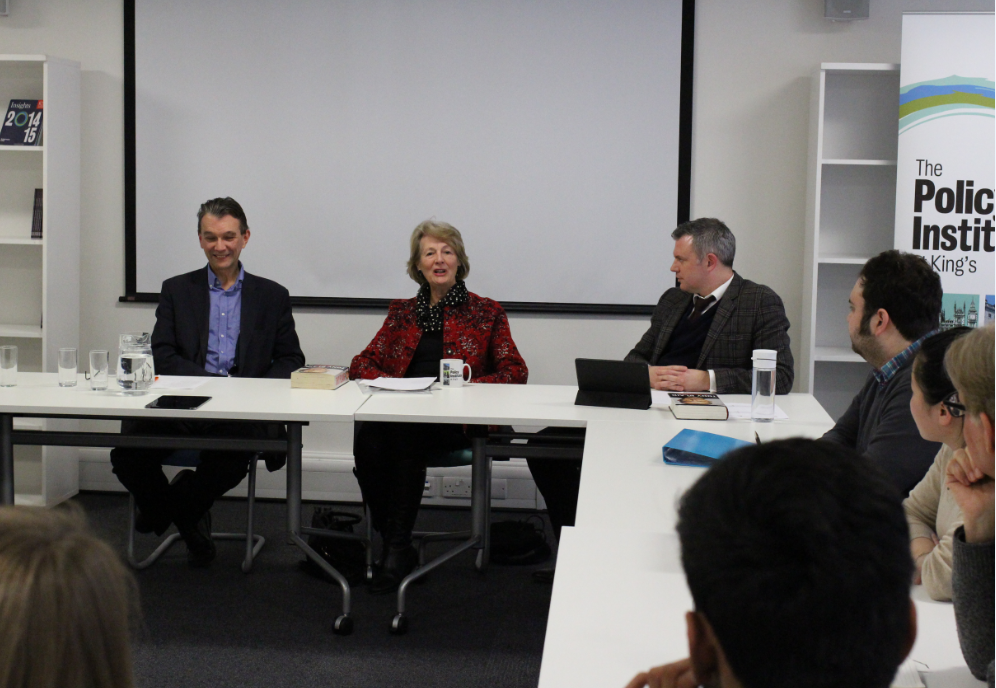Daily catch-up: Tony Blair, the lawyer, 'thought winning the argument was the same as making the change'
Baroness Jay, who served in Blair's first Cabinet, talked to students at King's London about making history


Thanks to Margaret Jay, Baroness Jay of Paddington, for talking to the first of the seminars in the "Blair Years" course for Masters students at King's College, London. Jon Davis and I co-teach this module of ultra-contemporary history, with the emphasis on evidence from the politicians, officials and advisers who lived through it.
She noted that Tony Blair's name had become negatively charged, so she started by saying that she was proud of the Blair government, and that she hadn't supported the Iraq war.
She listed four achievements that she had been involved in: Sure Start, which she helped to set up as a Health minister in the government's first year; Nice, the National Institute for Clinical Excellence, which is now called the National Institute for Health and Care Excellence although it keeps the Nice acronym; the partial reform of the House of Lords, which she took through when she was promoted to the Cabinet as Leader of the Lords in 1998; and women's representation, for which she was responsible as Women's Minister (a post that later became Equalities Minister), in addition to her role as Leader of the Lords. She promoted the change in the law to allow all-women shortlists for candidates for elected office, which passed after she had left the government in 2001.
She said Blair had the qualities she wanted in a leader: he was intelligent, articulate, personable and had a clear strategy. But he was a barrister: "Once he won a case he lost interest, and that could be frustrating." Another weakness was that a "lawyer thinks that winning the argument is the same as achieving the change", and it took time for Blair to realise that changing the public services required sustained follow-through.
She wanted him to go "much further" in reforming the House of Lords but felt that Blair moved on to other things once the initial change, to expel most of the hereditary peers, had been achieved. "People said you have to do it at the beginning of a parliament, but by the beginning of the next parliament [in 2001], he decided he wanted to do public service reform instead."
She thought constitutional reform under Blair had been "piecemeal" – and continued to be so, with further devolution being promised to Scotland as a last-minute "vow" in the referendum campaign. She thought Roy Jenkins's proposals, in 1998, for proportional representation (or more-proportional representation than under the first-past-the-post voting system) were a "great missed opportunity". She said: "That was a great 'we've moved on' thing."
Blair could also be inattentive and frivolous, she said, talking about him as if he were a brilliant but slightly wayward pupil. She described his "garden look", a phrase she invented to describe the way he would seem to be paying attention but would actually be staring past her at the Downing Street garden. She recalled the look when she and fellow Health minister Alan Milburn met him to discuss "hospitals without walls", a plan to get consultants out into local clinics, and he asked, "Do they have roofs?"
On another occasion, she was trying to get law through the Lords to encourage relationships education in schools, including the discussion of gay relationships. She had persuaded some conservative peers to speak against the idea but not vote, and was explaining the difficulties in a conference call including Blair on the morning of the vote. "As long as you can fix the churches by lunchtime we're in good shape," said the Prime Minister.
She was asked about Blair's relationship with Gordon Brown, and said she blamed Gordon more than Tony for their "not getting on", although the people around them both were also responsible. She said the relationship between David Cameron and George Osborne showed how it could and should be done.
She was asked how Blair compared as a prime minister with her father, James Callaghan:
My dad was very much of the era where you were the non-executive chairman of the board. He played the broad-church card properly. He had Tony Benn, Michael Foot and Denis Healey in his Cabinet. Tony was of a different era, when there is a tendency to be a much more personalised leader. They have similarities, though. Both of them were persuasive in language. Both liked to do things themselves. I came across a lot of papers written by my dad, handwritten, just as Tony wrote this whole book [A Journey] in longhand. They both used to sit on their own writing out their thoughts.
Her talk and answers to questions were an excellent introduction to the character of Labour's most successful prime minister. My contribution, apart from gently disagreeing that the absence of further constitutional reform was a missed opportunity, was to try to go back to how Blair was seen in 1997. For some of the students, who were nine when Blair became Prime Minister, this meant asking them to put aside the image of Blair as a divisive conviction politician, recognised around the world, and replacing it with the blandness of his being all things to all people. For a very long time, Blair was seen as a consensus politician whose main vice was that he was too much in thrall to focus groups and opinion polls.
Coincidentally, I was reminded yesterday of one of the most striking documents of the early Blair: a letter he wrote after standing unsuccessfully in the Beaconsfield by-election in 1982 to Michael Foot, the Labour leader. I wrote about it when it was unearthed in 2006. His great strength was that he came across as well-spoken but normal on television; but normal was the last thing he was.

Join our commenting forum
Join thought-provoking conversations, follow other Independent readers and see their replies